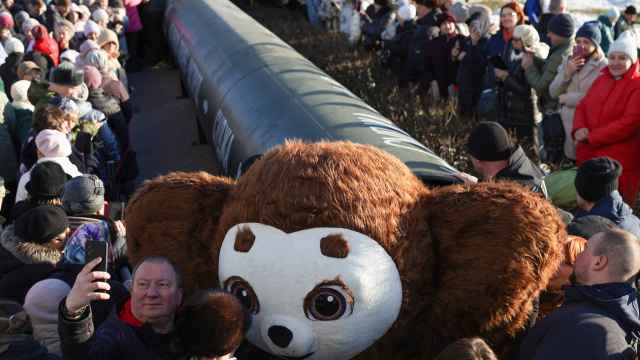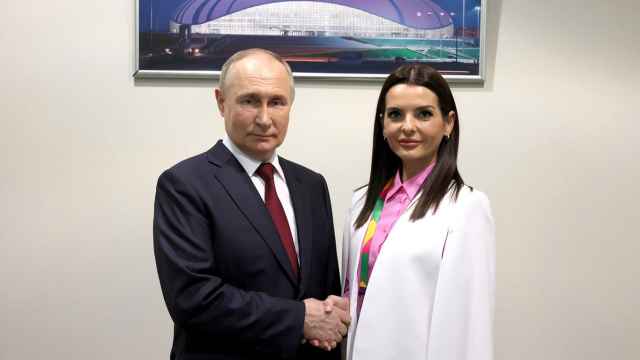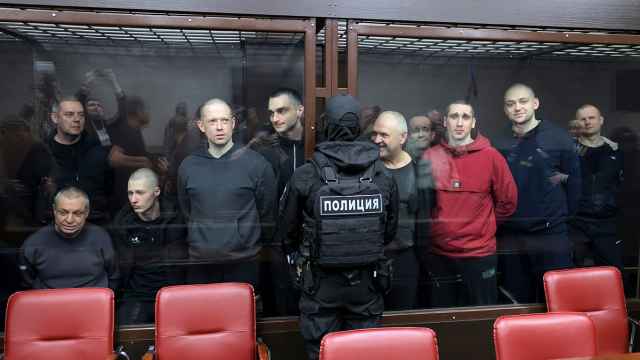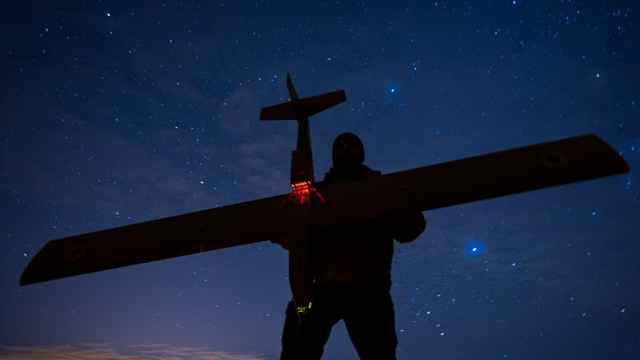Diplomacy will be essential to ending the ongoing Ukraine conflict, but more than a year into it the key stakeholders in the crisis lack the political will to compromise with one other and to commit to a peaceful resolution, analysts told The Moscow Times amid reports of fresh fighting near Donetsk.
Following several months of relative calm, disturbed only by occasional bouts of short-lived local skirmishes, heavy artillery has been rolled out once again in the ongoing conflict between pro-Russian insurgents and Kiev's forces.
The conflict in Ukraine's east has taken a devastating toll on the region's population. It had claimed more than 6,400 lives, according to the latest figures released by the United Nations, and some 15,900 have been wounded. Much of the region's economic infrastructure has been destroyed.
The recent resurgence of violence in war-battered eastern Ukraine highlights the frailty of the internationally brokered Minsk accords. Though they may have been successful in producing a temporary respite from the fighting after they were signed in February, the accords have thus far proved incapable of offering a framework for a more fundamental resolution of the conflict.
Accusations Repeated
Predictably, when fighting flared last week, the fighters and the external stakeholders in the conflict were quick to blame each other.
Ukrainian President Petro Poroshenko claimed the rebels launched the attack with the help of the Russian armed forces, and ordered his military to prepare for a possible "full-scale" invasion by Russia along the length of their joint border.
"The concentration of Russian troops near the state border is 1 1/2 times greater than it was a year ago," Poroshenko declared during his state of the nation speech, delivered before the Ukrainian parliament on Thursday.
Igor Konashenkov, official spokesperson for Russia's Defense Ministry, quickly denied Poroshenko's claims in comments carried by the RIA Novosti news agency.
In another typical exchange, Western officials blamed Russia for the flare-up, while Moscow claimed that Kiev provoked fighting ahead of both the Group of 7 summit that got under way Sunday in Germany and the upcoming deadline for the extension of biting European sanctions against Russia.
"The Ukrainian side has taken steps to aggravate tensions many times in the past in the run-up to some major international events. … We are seriously concerned now over the most recent manifestation of such activity," RIA Novosti cited Kremlin spokesman Dmitry Peskov as saying on Thursday.
Upon his arrival to the Bavarian Alps on Sunday, U.S. President Barack Obama said that "standing up to the Russian aggression" would be discussed at the G7 Summit.
Speaking with Italian journalists ahead of his upcoming visit to Milan, President Vladimir Putin denied that Russia is driven by a lust for aggression. He reiterated his stance that peace in Ukraine will require Kiev to to ensure the autonomous rights of the self-proclaimed rebel republics of Luhansk and Donetsk.
"The problem is that the current Kiev authorities don't even want to sit down to talks with [the leaders of the rebel republics]. And there is nothing we can do about it. Only our European and American partners can influence this situation," Putin said, noting that sanctions and threats of such against Russia won't breathe new life into the Minsk accords.
"Incidentally, the leaders of the self-proclaimed republics have publicly stated that under certain conditions — meaning the implementation of the Minsk agreements — they are ready to consider themselves part of the Ukrainian state," he said.
Amid these and other statements, the diplomatic effort to solve the crisis was undermined by the decision on Saturday of Heidi Tagliavini, the OSCE's special representative to the Minsk contact group, to step down from her role. According to sources inside the group, Tagliavini — who was praised by all sides for her role in the negotiations — left due to her disenchantment with the accords' implementation, RIA Novosti reported.
No Surprises
According to Vladimir Yevseyev, director of Moscow-based think tank the Center for Social and Political Research, given the continuous failure of the diplomatic process, it was inevitable that intense fighting would resume at some point.
"Both sides had to restore their resources and mobilize their forces," Yevseyev, who correctly predicted in March that combat in the region would pick up again in June, told The Moscow Times in a phone interview.
"What is worrying is that heavy artillery has largely returned to the same positions it occupied before the Minsk talks," he said.
One of the key provisions of the Minsk accords was the withdrawal of heavy arms by both sides. According to Yevseyev, some of that weaponry has taken the opposite route, moving closer to the front lines.
Limited Options
Mikhail Pogrebinsky, director of the Center of Political and Conflict Studies in Kiev, was likewise unsurprised by the revival of fighting.
"It is clear that Kiev does not want to talk to the insurgents, whom the leaders regularly refer to as 'terrorists.' And what do you do with terrorists?" he said in a phone interview.
According to Pogrebinsky, the only diplomatic solution to the crisis would entail democratic elections to give rise to legitimate leaderships in the rebel-held regions. These elections should be observed by European, Ukrainian and Russian polling monitors, which would pave the way for a comprehensive conflict-resolution process, he said.
"The only alternative to elections is a war of attrition, which Ukraine would likely lose," he said. "Such a scenario would be tragic."
Andrei Piontkovsky, a respected opposition-minded Moscow-based political analyst has another theory: that Putin offered the West the option of freezing the Ukraine conflict, but to no avail.
"Putin proposed the option of a peaceful coexistence with the West. Russia would keep Crimea, but would refrain from further expansion into Ukraine," said Piontkovsky, who based his speculation on the talks between Putin, Foreign Minister Sergei Lavrov and U.S. Secretary of State John Kerry held last month in Sochi.
"It is clear that this offer was rejected and now Putin has no choice but to escalate the situation," he said in a phone interview.
Contact the author at i.nechepurenko@imedia.ru
A Message from The Moscow Times:
Dear readers,
We are facing unprecedented challenges. Russia's Prosecutor General's Office has designated The Moscow Times as an "undesirable" organization, criminalizing our work and putting our staff at risk of prosecution. This follows our earlier unjust labeling as a "foreign agent."
These actions are direct attempts to silence independent journalism in Russia. The authorities claim our work "discredits the decisions of the Russian leadership." We see things differently: we strive to provide accurate, unbiased reporting on Russia.
We, the journalists of The Moscow Times, refuse to be silenced. But to continue our work, we need your help.
Your support, no matter how small, makes a world of difference. If you can, please support us monthly starting from just $2. It's quick to set up, and every contribution makes a significant impact.
By supporting The Moscow Times, you're defending open, independent journalism in the face of repression. Thank you for standing with us.
Remind me later.





